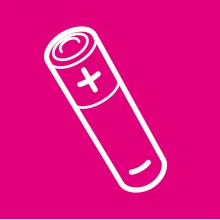Batteries
Batteries come in all shapes and sizes, that present a variety of challenges when it comes to recycling. Most households will frequently need to dispose of portable consumer batteries, AAs, AAAs and other sizes that are used in electrical and electronic equipment. A little less frequently, we also need to dispose of rechargeable (lithium-ion) batteries and automotive batteries.
In all cases, the chemistry of these batteries means that they need to be recycled when possible, as they are made using elements, including heavy metals such as lead, mercury and zinc. These materials are toxic to the environment and our health so putting them in with general waste is potentially harmful and households should use the range of recycling collection options that are available.
The UK’s waste battery regulations set out requirements for companies that produce batteries to finance their recovery. The regulations also mean large retailers that sell batteries, such as supermarkets, must provide a collection point for these to be returned for recycling.
Some local authorities include the collection of potable consumer batteries in their doorstep collection service, but it is necessary to check this with your council first. All local authorities provide a collection point for these at household waste recycling centres (HWRCs), as well as automotive and rechargeable batteries. The data presented here specifically covers the batteries collected by councils.
Portable batteries
About 40,000 tonnes of portable batteries are sold in the UK every year, of which, just under 18,000 tonnes are currently collected for recycling. Around three-quarters of these are alkaline/zinc-carbon batteries used in handheld electronic devices. Button cell (circular) batteries are typically composed of mercury, silver-oxide or zinc are used in smaller devices.
Rechargeables, such as nickel-metal hydride, nickel-cadmium or lithium-ion batteries, used in a range of household electronics are also collected, though where possible it is advantageous to collect these separately.
Once collected, these are sent for sorting at facilities with specialist equipment that is able to accurately determine the chemical type of battery with a high level of accuracy. These batteries are then stored separately. In particular, care is required in the handling of lithium-ion batteries, which are particularly associated with a risk of fire.
Each type of battery is then sent on to specialist reprocessing plants, to extract the recoverable materials and safely dispose of the remainder.
The most common batteries, alkaline/zinc-carbon, are shredded to obtain the metal, plastics and paper from the core. Alkaline batteries are treated in a high-temperature rotary kiln to extract the zinc-oxide, that is then used in a variety of industrial applications.
Lithium batteries, nickel-cadmium and nickel-metal hydride are managed in thermal vacuum vaporisation units at a high temperature, which evaporates and then condenses the precious metals.
Similarly, mercury from mercury cell batteries is treated at a high temperature, to decontaminate the steel part of the battery and separate the mercury.
Automotive batteries
Batteries used in vehicles are composed of lead dioxide and sulphuric acid, as well as small amounts of silver, hard plastic casing and water. These materials are harmful but can be recovered for valuable further uses.
To achieve this involves a process that crushes the batteries, creating a slurry-like substance, that then undergoes a regulated process to separate out the different elements. The acidic water undergoes a chemical treatment, to purify the water; the lead and silver is melted for uses in future batteries; the plastic is turned into pellets to be later cast into new cases for car batteries.






 England
England
 Wales
Wales
 France
France
 Belgium
Belgium
 Germany
Germany